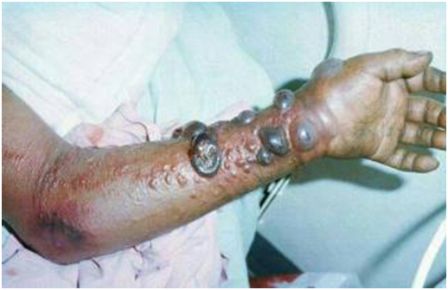 As the Ebola virus continues to spread through West Africa—where the death toll has now reached almost 900—an experimental drug previously untested in humans may offer a cure. The treatment, known as ZMapp, was developed by Mapp Biopharmaceutical in San Diego. The company has recently hinted that it may be ramping up production of the “secret serum.”
As the Ebola virus continues to spread through West Africa—where the death toll has now reached almost 900—an experimental drug previously untested in humans may offer a cure. The treatment, known as ZMapp, was developed by Mapp Biopharmaceutical in San Diego. The company has recently hinted that it may be ramping up production of the “secret serum.”
ZMapp was first identified as a potential cure back in January but, according to the company, has not yet completed the first phase of safety testing. However, last week, when two Americans working in Liberia, Dr. Kent Brantley and Nancy Writebol, came down with the disease, they were offered the experimental treatment, CNN reported.
According to the National Institutes of Health (NIH), Samaritan’s Purse—the nonprofit aid agency for whom Brantley and Writebol had been volunteering—contacted U.S. Centers for Disease Control and Prevention (CDC) officials in Liberia to ask about experimental treatments they had read about in the scientific literature. The CDC referred them to an NIH scientist on the ground in West Africa, who “informally answer[ed] some questions and referred them to appropriate company contacts to pursue their interest in obtaining experimental product.” According to the NIH, this scientist was “not officially representing NIH and NIH did not have an official role in procuring, transporting, approving or administering the experimental products.”
Three frozen vials of the drug were flown to Liberia, arriving on July 31; it is still unclear why, but initially, only one dose had thawed and Brantley reportedly offered it to Writebol. But when Brantley took a turn for the worse—”I’m going to die,” he said—his doctors decided to administer the drug to him.
Though Brantly and Writebol are still ill, the early signs indicate that the drug may be working. Reportedly, Brantly was improving within hours of receiving the experimental treatment and has now made a “near complete recovery” Writebol did not react immediately to the first dose of the drug, but after a second dose also began to improve.
Mapp Biopharmaceutical declined Newsweek’s interview request but said via email it was “in the midst of an intense effort” to address the Ebola outbreak in West Africa. According to Mapp’s website, ZMapp is funded by the U.S. Army Medical Research Institute of Infectious Disease and the Defense Threat Reduction Agency. Last week, the DTRA announced that it would put more money behind ZMapp in order to produce sufficient quantity “to perform a Phase 1 clinical safety study.”
The goal, it seems, is to quickly get enough of the drug to bring it through the Food and Drug Administration (FDA) approval process. The FDA does, on rare, life-threating occassion, allow experimental drugs to be distrubeted without prior approval, under “compassionate use” conditions. The regulator has not yet stated whether this case fit that definition.
 According to an information sheet provided by Mapp, ZMapp is composed of three antibodies “manufactured in plants;” specifically, plants from the Nicotiana genus—the same group of plants used in cigarette tobacco. The company described it as “an optimized cocktail” that combines two other compounds known as MB-003 and ZMAb.
According to an information sheet provided by Mapp, ZMapp is composed of three antibodies “manufactured in plants;” specifically, plants from the Nicotiana genus—the same group of plants used in cigarette tobacco. The company described it as “an optimized cocktail” that combines two other compounds known as MB-003 and ZMAb.
The latter of the two, ZMAb, was the subject of several recent studies on macaques. The first study, published in 2012, evaluated the drug’s effectiveness when given to the animals either 24 or 48 hours after infection. All four of the macaques who began their treatment within 24 hours survived “with no apparent side effects,” and two of the four who began after two days fully recovered. In a second study, published in November of 2013, the six surviving macaques were then again infected with Ebola ten weeks after the first test in order to evaluate whether they had built up a resistance to the virus. All six survived.
These results, despite being in animal models, offer hope for the hundreds who are still fighting a disease that in some cases can have a 90 percent mortality rate.
More Ebola treatments are certainly needed in West Africa, but they may be required in the U.S. as well. According to WABC-TV in New York, a patient at Mount Sinai Hospital in Manhattan is currently being screened for a Ebola. The man, who had recently visited West Africa, came into the emergency room with “high fever and gastrointestinal systems,” ABC reported. Mapp Biopharmaceutical has not said whether or not the man will be given ZMapp if he does, in fact, have the virus.











Wonderful post however , I was wondering if you could write a litte more on this subject?
I’d be very grateful if you could elaborate a little bit further.
Bless you!